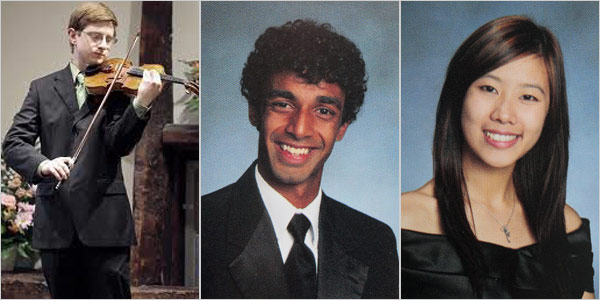It appears that the courts are sticking to their resolve to tie serious consequences to bullying that ends in suicide, at least in the high-profile case of Tyler Clementi. Earlier it developed that Tyler’s roommate, Dharun Ravi, was being charged with 15 different counts, and could spend years in jail if convicted of the most serious ones. While it was initially unclear whether Molly Wei, Ravi’s friend who was involved in the crime of broadcasting Tyler’s private information over the Internet, would be charged, it now appears that she will have charges against her dropped in exchange for testifying against Ravi.

That doesn’t mean she’s completely in the clear, however – she’s still required to complete 300 hours of community service, undergo cyberbullying counseling, and take classes about “how to respect people of different backgrounds.” And that’s just for being party to the bullying. It sends a strong message about the court’s opinion on the gravity of this matter, and their willingness to make an example of the people involved in this case in the hopes that it will keep anything like this from happening again.
It seems like they’ll have to hope that the example works, though, because we aren’t hearing many other stories about bullies being brought to legal justice after the tragic rash of suicides in the fall. Most likely, this is because other cases are much harder to prosecute – many of them involve young children, who are at best tricky to prosecute for crimes like the ones Ravi is charged with, like “invasion of privacy with bias intimidations.” For instance, gay 15-year-old Lawrence King was shot to death by 14-year-old Brandon McInerny in February of 2008; as of last week, McInerny had yet to go to trial despite universal consensus that he is responsible for the murder of one of his classmates. In part, this is because of an ongoing debate about whether he should be tried in adult or juvenile court. There is now a “Seth’s Law” being created in memory of 13-year-old suicide victim Seth Walsh, but it seems unlikely there will be any convictions of individuals as a result of his death – there may not have been a single indivdual at fault, and rather a large group or ‘herd mentality.’
 In the Tyler Clementi case, there is no such issue; the people involved are clearly identifiable, were over 18, and the fact that all the ‘bias intimidation’ in question took place over the internet means it’s trackable and provable in court. The ‘cyberbullying’ aspect gives it extra pertinence, as cyberbullying leading to suicide has been a much-discussed epidemic among straight teens as well. As such, prosecutors are lucky in that harsh consequences seem to be in the works for a crime that’s usually viewed as a nebulous social problem, to be corrected by parents or school authorities.
In the Tyler Clementi case, there is no such issue; the people involved are clearly identifiable, were over 18, and the fact that all the ‘bias intimidation’ in question took place over the internet means it’s trackable and provable in court. The ‘cyberbullying’ aspect gives it extra pertinence, as cyberbullying leading to suicide has been a much-discussed epidemic among straight teens as well. As such, prosecutors are lucky in that harsh consequences seem to be in the works for a crime that’s usually viewed as a nebulous social problem, to be corrected by parents or school authorities.
It’s possible that the example being made of Dharun Ravi and Molly Wei will have an impact on college campuses – with today’s extremely competitive and extremely expensive university environment, many students are loath to risk their academic standing or chances of graduating. But what will this case do on the playground or in the high school cafeteria? The majority of bullying of gay teens doesn’t happen in the form of a streaming video, and isn’t necessarily recorded in tweets and texts like the ones Ravi tried to erase. This case may bring some level of justice to Tyler Clementi’s untimely death, and will hopefully make college campuses a safer place, but ultimately there may be a limit to how much difference you can make in a classroom from the distance of a judge’s bench.
Homepage thumbnail image via Frank H. Conlon, Associated Press








Comments
does anyone else think its ironic that the people who are being charged/testifying-to-not-be-charged would be identified as minorities to the naked eye?
Not ironic at all. Unsurprising. I STRONGLY doubt that the perpetrators would be receiving such stiff penalties if they’d been a couple of all-American football jock/cheerleader types.
Erm, I forgot the key word there. A couple of WHITE all-american jock types.
It’s something that stops and makes me think and makes me supremely uncomfortable to the way it could be perceived by other people. Like “homophobic brown person harasses white homosexual person.”
I’m still trying to tease out my feelings in this whole situation, so sorry if the above isn’t very coherent.
I think I get what you mean. Instead of Molly and Dharun being recognised just as assholes, they’ll end up being representative of their race. “See! You can’t trust those Asians! They’re all HOMOPHOBIC KILLERS!”. There’s still quite a bit of racism amongst queer circles and cases like these really aren’t helping the rest of us who are queer & a minority.
Yes, exactly. This reminds me a bit of when Prop 8 passed in CA and there was rhetoric floating around that it was the African American votes that helped passed it. I recall there being violence and hate rhetoric being directed towards African Americans at protests in response to Prop 8’s passing.
Like my heart sank when I saw those photographs of Molly and Dharun and I remember thinking “Why did he have to be brown?” Not like it’s his FAULT that he’s brown or anything but being representative of their race is exactly what it comes down to for me. Like fuck, I’m brown and queer.
Rachel, I love you. Thank you.
the photos of all three of the people in this article feature them in formalwear. this is the fanciest tragedy ever, i guess.
either that or high school is just stupid
Senior portraits tend to do that.
Am I the only one who thinks this girl is getting off too easy? I mean, I don’t think they need any more testimony that Ravi is guilty of instigating Clementi’s suicide.
Additionally, if they’re using this case as an “example” to others (an idea that I find generally awful as it’s used to give harsh sentences “to prove a point”– but don’t all cases prove a point in theory?), shouldn’t she be punished as well? I’m not entirely sure to what extent she had a hand in this, but I would imagine it would be beneficial to show that even if you’re not the person posting the videos/tweets/etc., you’re still being a bully and should therefore be treated like one.
So goes the plea bargain.
Which friend is she concerned with , Tyler, Rave – Molly
Not to say that these students shouldn’t be punished, but the American trend of making examples of colored people who harm white people really sickens me a bit. They deserve the punishment, but to say that this has nothing to do with race is simply wrong.
“They deserve the punishment, but to say that this has nothing to do with race is simply wrong.”
Yes, this exactly. It’s complicated because I feel that it’s impossible that their race doesn’t factor in how this case is being prosecuted, but their actions were reprehensible, so I feel that it’s an issue that is going to be glossed over.
It’s also tricky because we’re not terribly likely to see a case like this any time soon, so it really does remain to be seen how it would be treated if the perpetrators were white. :/
I must be naive because I haven’t really thought of this as a racial issue at all. If anything, all it says to me is that teens of any background are equally capable of being obnoxious, thoughtless and cruel. I think Wei is getting off too easily because she could have put a stop to the situation simply by telling Ravi that he could not use her computer. I can’t figure out why she didn’t just say NO. I sure hope that anybody, of any color, who did this to someone else would face the stiffest prosecution.
[…] Tyler Clementi and the other teens who have committed suicide because of bullying are still on my mind, especially after recent legal action on his case these past couple of weeks related to his former roommate and hallmate. […]